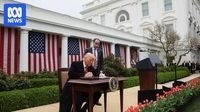Australia has managed to dodge the worst of the tariffs imposed by the United States under President Donald Trump, but experts warn that the economic repercussions could still be severe. On April 3, 2025, Trump announced a series of reciprocal tariffs that will take effect on April 5, impacting various trading partners, including Australia.
While Australia has been subjected to a flat 10 percent global tariff, it has avoided the much higher "reciprocal tariffs" that the U.S. has levied on many of its largest trading partners. Notably, Australia’s gold and pharmaceutical exports to the U.S. have been exempted from this round of tariffs, providing some relief to the nation’s economy.
Prime Minister Anthony Albanese described the tariffs as "totally unwarranted" and "not the act of a friend," but acknowledged that Australia had received a more favorable outcome compared to other nations. "There's no doubt that there's no-one that's got a better deal, and people will see that themselves," Albanese remarked. "That doesn't mean it's a good thing." Despite the relatively mild impact, the tariffs are expected to affect Australian farmers, particularly those in the beef industry.
Australian beef farmers have been singled out, as the U.S. has hinted at a potential ban on beef imports. However, Trump clarified that the U.S. imported $3 billion worth of Australian beef in the previous year and has no intention of stopping these imports. "They won't take any of our beef. They don't want it because they don't want it to affect their farmers," Trump stated.
Mark Thomas, a beef farmer from Western Australia, expressed relief that Australia is on an "even playing field with the rest of the world," noting that the 10 percent tariff is the lowest imposed on any country. He pointed out that beef export prices are currently high due to low herd numbers in the U.S., and that Australian consumers are unlikely to feel the financial pinch at the checkout, as prime cuts are not typically exported to the U.S.
"A lot of it's lean trim, which is used for hamburgers. So unless you're having hamburgers every night, you're probably not going to be too affected," Thomas explained. However, the tariffs may lead to increased prices for American consumers, particularly those who enjoy hamburgers made with Australian beef. According to estimates from the Red Meat Advisory Council (RMAC), Americans consume roughly six billion hamburgers containing Australian beef each year.
Industry experts warn that the broader implications of these tariffs could be significant. Dr. Daniel Kiely from Curtin University emphasized that the tariffs would impact Australia not just directly, but indirectly as well. "China, for example, is our major trading partner. Any slowdown in the Chinese economy is likely to hurt us here in Australia," he said, highlighting the potential risks to Australia’s exports of iron ore, coal, and gas.
As the U.S. imposes tariffs of 34 percent, 24 percent, and 25 percent on China, Japan, and South Korea respectively, the repercussions could ripple through the region. Foreign Minister Penny Wong noted that Asian countries are among "the hardest hit" and expressed concern about the disruption these tariffs could cause in the global economy.
Wong stated, "We do not underestimate the disruption these decisions will have on the economies of our region and the global system. But we face those challenges calmly and maturely. We certainly won't be picking fights in our neighbourhood." This sentiment reflects a broader strategy to maintain diplomatic relations while navigating the complexities of international trade.
Former State Department official Evan Feigenbaum warned that the U.S. tariffs could diminish American influence in Asia. He stated on social media, "Over the medium term, bye-bye U.S. influence in Asia. It was already being reshaped faster than the U.S. was adapting."
In response to the tariffs, Prime Minister Albanese announced $50 million in government funding to support affected industries in seeking new export markets. "This is the time to stand up for Australian farmers and get behind us to continue our workers producing high-quality food for not only the nation but the world," said David Jochinke, president of the National Farmers' Federation, welcoming the government’s support.
Opposition leader Peter Dutton criticized the government for failing to secure an exemption for Australia. He argued that if the Prime Minister had leveraged critical minerals and defense within the relationship earlier, a different outcome might have been achieved. "We would have had greater connection and greater communication with the White House," Dutton stated.
While the tariffs have raised concerns among farmers and industry leaders, they have also ignited discussions about the future of Australia’s trading relationships. The potential for a trade war looms large, as countries like China have previously warned they might respond in kind to U.S. tariffs.
As the situation continues to evolve, the Australian government is faced with the challenge of recalibrating its strategic assumptions in light of these developments. The economic fallout from the U.S. tariffs could lead to less regional growth, increased poverty, and the entrenchment of authoritarianism in neighboring countries, creating a precarious situation for Australia.
In summary, while Australia has managed to avoid the worst of the U.S. tariffs, the broader implications for its economy and trade relationships remain uncertain. As the government navigates this challenging landscape, the focus will be on supporting local industries and maintaining strong ties with trading partners in the region.





